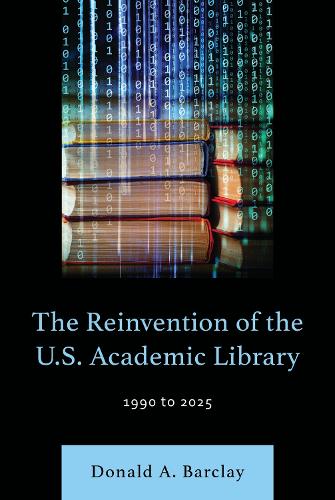
The Reinvention of the U.S. Academic Library: 1990 to 2025
(Paperback)
Available Formats
Publishing Details
The Reinvention of the U.S. Academic Library: 1990 to 2025
By (Author) Donald A. Barclay
Bloomsbury Publishing PLC
Rowman & Littlefield Publishers
7th August 2025
United States
Classifications
Professional and Scholarly
Non Fiction
027.70973
Physical Properties
Paperback
224
Width 178mm, Height 254mm
Description
The information most essential for life in the modern world falls under the rubric of scholarly communication: the vast and ever-growing body of words and data produced by scholarly researchers, the majority of whom work in academia. Scholarly communications are fundamental to creating and informing such essential elements of modern life as the digital and mechanical tools we use every day, the built world in which we live, advanced healthcare, macro- and micro-economic choices, environmental sustainability, concepts of justice and equity, and a fuller understanding of the history that led to, and continues to shape, the world we now inhabit.
For the last several centuries, there have been three key components to scholarly communication:
- The scholars who conduct the research, gather the data, and record their findings.
- The scholarly publishers who replicate and distribute those findings.
- The academic libraries that provide the last-mile connection between the fruits of scholarly communications and the researchers, instructors, students, and members of the general public who then use that information to advance learning and make decisions both personal and public.
Focusing on U.S. academic libraries, Rewiring the Academic Library begins by providing a concise history of the traditional role and function of academic libraries from their earliest times up to the dawn of Digital Age and the spread of digital technology into all aspects of academic research and scholarly communication. This introduction is followed by chapters analyzing how digital technology has transformed, over the course of a few swift decades, not only the role and function of academic libraries, but also the nature of scholarly communication itself.
Specifically, Rewiring the Academic Library will consider how digital technology has changed the way academic libraries:
- Acquire and exercise bibliographic control over collections.
- Provide equitable access to information. Allocate and utilize library space. Instruct and guide students, faculty, and others.
- Relate to the larger academic and scholarly publishing communities. Sustain scholarly communications.
Author Bio
Donald A. Barclay worked as an academic librarian from 1990 until his retirement in 2022, during his library career holding positions at New Mexico State University, the University of Houston, the Texas Medical Center, and the University of California, Merced. Barclay began working at the University of California, Merced in 2002, before ground was broken on what would become the first (and thus far only) new U.S. research university of the twenty-first century. The unique opportunity of creating an academic research library from the ground up at a time when digital technology was expanding into every aspect of human life and radically transforming scholarly communication allowed him to both closely observe and actively participate in the biggest technological change to hit libraries since the advent of printing from moveable type.
Barclay has authored numerous articles and books over the course of his career on topics ranging from the literature of the American West to childrens literature to library and
